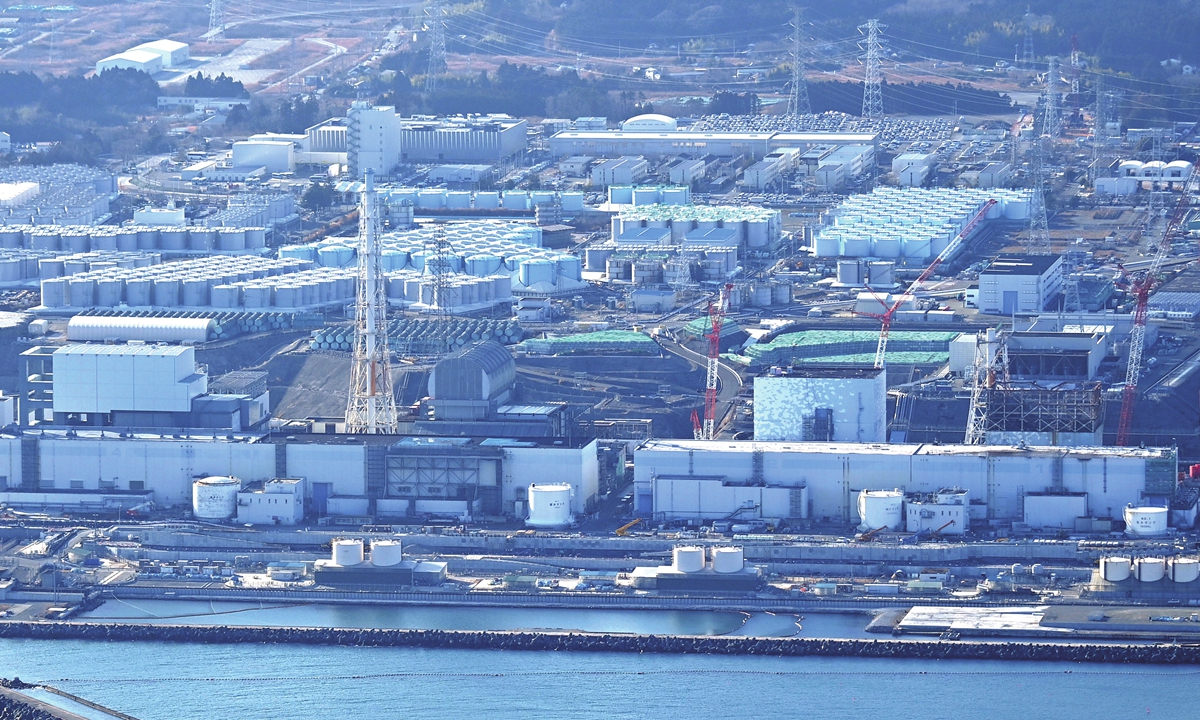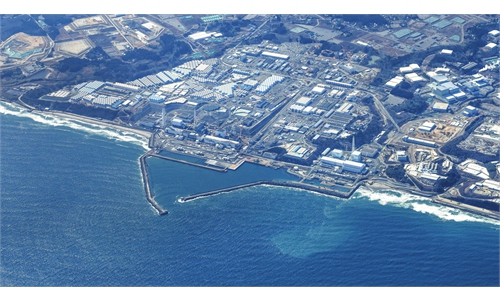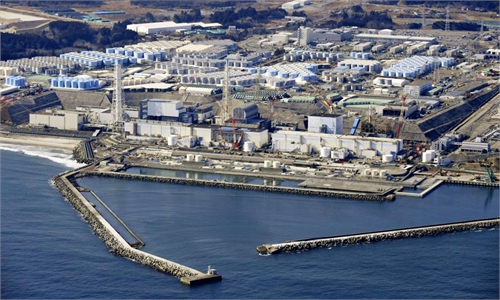Japan's radioactive wastewater dumping plan a destructive nuclear colonialism practice

Damaged No.1 to No.4 reactors are seen at Fukushima Daiichi Nuclear Power Plant on January 19, 2023 in Okuma, Fukushima, Japan. Photo: VCG
Editor's Note:
Japan's plan to dump into the ocean has been strongly condemned by the international community. Nonetheless, Tokyo is still going its own way and speeding up the plan to make the rest of the world pay for it. What would be the global impact of Japan dumping nuclear-contaminated wastewater? Does Japan's move violate the law and infringe on the rights of relevant countries? Global Times (GT) reporter Liu Zixuan talked with Karly Burch (Burch), a sociology lecturer from the University of Auckland, who has been studying the aftermath of the Fukushima Daiichi nuclear disaster for the past 12 years, over these issues.
This is the fourth piece of the series.
GT: What would be the global impact of Japan dumping nuclear-contaminated wastewater into the ocean?
Burch: Nuclear colonialism is a very common tactic used by the nuclear industry globally. It involves targeting indigenous peoples, their lands and waters as the excavation sites, bomb detonation sites and waste sinks needed to maintain nuclear production processes. Tokyo Electric Power Company (TEPCO) and the Japanese government's plan to discharge Fukushima Daiichi's nuclear-contaminated wastewater into the Pacific Ocean against the will of Pacific peoples is a textbook example of nuclear colonialism.
While nuclear colonialism is a very destructive practice that many people would disagree with, it is a key tactic used to sustain the nuclear energy industry. And, unfortunately, TEPCO's wastewater discharge plan is one example in an already very long history of nuclear colonialism in the Pacific. People, lands, and waters in the Pacific have long been targeted by nuclear imperial nations like the US and France as bombing sites to test their nuclear weapons. There is also a long history of corporations and governments dumping nuclear waste into the ocean, including attempts by Japan to dump nuclear waste in the Marianas back in 1979.
In the Nuclear Connections Across Oceania statement of solidarity against TEPCO's wastewater discharge drafted in November 2022, authors, including me, from across the Pacific, Japan, New Zealand and the US emphasized that Pacific peoples bear fundamental rights to a clean, healthy, and sustainable environment. We stressed that the Japanese government and TEPCO's nuclear waste discharge plan shows direct disregard for the sovereignty and self-determination of Pacific peoples and the ocean their livelihoods depend upon. We also explained how the plan shows direct disregard for frontline community members within Japan, many of whom rely on the ocean for their well-being and livelihoods, who are also demanding an end to the wastewater discharge.
GT: The Japanese government unilaterally declared that it would start discharging nuclear-contaminated water into the sea this spring and summer despite global resistance and opposition. What is your opinion of Japan's moves?
Burch: Many people from across the globe have been speaking out against TEPCO's plan, including many scientists based in the US.
For example, in December 2022, scientists at over 100 marine science laboratories in the US authored a position paper voicing scientific opposition to TEPCO's plan based on concerns "about the absence of critical data on the radionuclide content of each tank, the Advanced Liquid Processing System, which is used to remove radionuclides, and the assumption that upon the release of the contaminated wastewater, 'dilution is the solution to pollution.'"
On January 18, 2023, the Pacific Islands Forum Secretariat held a very informative public seminar where their panel of independent, globally-respected scientific experts shared their assessment of TEPCO's wastewater discharge plan from a scientific perspective. During the seminar, the scientists clearly stated that TEPCO's scientific studies were "incomplete, inadequate, and inconsistent."
Once the Japanese government and TEPCO heard feedback from the Pacific Islands Forum Secretariat's experts, they said they would pause the discharge plan and engage in dialogue with the scientists and the Pacific Islands Forum Secretariat. However, the Japanese government and TEPCO continue to refer to the planned discharge as "safe," which shows that they are not taking the comments of these and other scientists seriously.
GT: You have called on the New Zealand government to support other concerned Pacific governments and peoples by playing a leading role in taking a case to the International Tribunal for the Law of the Sea against Japan. What actions have the New Zealand government and other Pacific governments taken so far? What further actions should be taken?
Burch: Authors of the Nuclear Connections Across Oceania statement of solidarity against TEPCO's wastewater discharge plan have asked the New Zealand government to take a case to the International Tribunal for the Law of the Sea against Japan. This is because, the core question raised by TEPCO's wastewater plan is whether Japan will respect the sovereignty and self-determination of Pacific peoples, and whether we as a global collective think it is okay for the nuclear energy industry to continue using our oceans and waterways as sinks to freely discharge its nuclear waste. We have many international agreements, including the Law of the Sea, which clearly states that causing pollution of the high seas, which TEPCO's plan is expected to do, is not an acceptable practice. But there has yet to be a country brave enough to take Japan to court about this.
Burch: Based on what we have seen thus far, it is fair to assume that TEPCO and the Japanese government will go ahead with their nuclear waste discharge plan unless a neighboring country takes a case to the International Tribunal for the Law of the Sea against Japan concerning the proposed radioactive wastewater release. Lawyer Duncan Currie has been advocating for this, saying that it would be an open-and-shut legal case since Japan is not legally permitted to cause this pollution of the high seas. It is rather startling that there is no country, even those who have signed these agreements, willing to stand up for the health of the Pacific Ocean and the sovereignty and self-determination of Pacific peoples who depend on the ocean for their wellbeing and livelihoods.
GT: So far, we have not heard any official voices from the US or major Western countries opposing Japan's decision. What is your opinion on this? Do you think this encourages Japan?
Burch: TEPCO and the Japanese government often say that discharging radioactive wastewater from nuclear reactors into waterways is a normal practice for the nuclear energy industry. Unfortunately, they are right. Using waterways as sinks for nuclear waste is a normal practice for the global nuclear energy industry. However, that does not mean it is a good practice that should be allowed to continue.
Decisions to use waterways as sinks for nuclear waste are based on colonial land and water relations, which assume land and water will be available to sustain the nuclear energy industry. It does not matter if the waterways are also needed to sustain the well-being and livelihood of others, since the assumption is that the nuclear energy industry is entitled to use lands and waters as sinks for their waste - meaning other uses do not matter as much. Dominant nuclear safety standards are also based on these assumptions about access to land and water as sinks for nuclear waste, so can be drawn on to legitimize this kind of pollution.
TEPCO's nuclear wastewater plan is an opportunity for the global community to speak up against nuclear colonialism and to ensure the companies and countries who profit off of nuclear technologies are responsible for managing their waste in ways that do not impede the sovereignty and self-determination of others. These practices also raise many questions about the sustainability of nuclear energy. Particularly, how can a technology sustained by nuclear colonialism be considered environmentally and socially sustainable?


